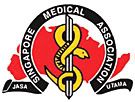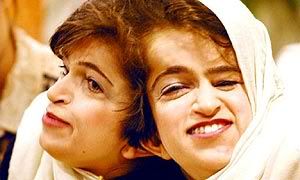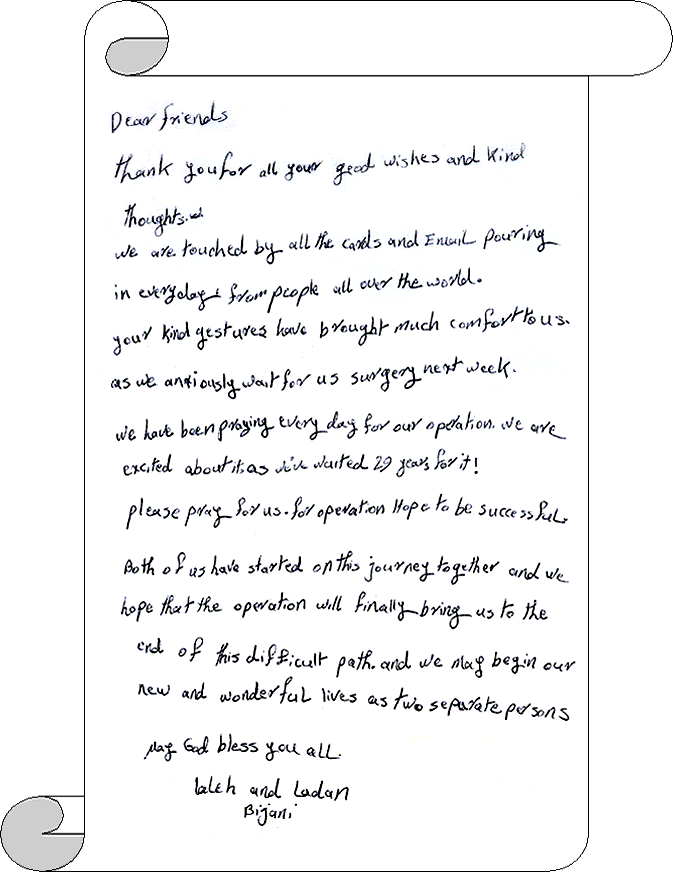OTGV #36 - Blood
Broadcast Date: 25/08/03
Singapore lags significantly behind other developed countries in terms of blood donations.
A new effort called Centre for Transfusion Medicine or C-T-M at the Health Sciences Authority has launched a initiative to drive up the number of blood donors.

Director of Medical Services Tan Chorh Chuan says the new system aims to provide a more seamless and less disruptive means for existing or potential blood donors.
"The DonorCare@HSA system is a new IT initiative which has been developed to provide blood donors with a new dimension of service. Using Donorcare@HSA, blood donors will be able to interact more efficiently with the Bloodbank@HSA thru the internet. It is hope that blood donors will find this new resource useful and that it will also encourage new donors to come forward."
The drive to get new blood donors is crucial.
Blood banks all over the world are facing the problem of not having enough donors.
Professor Tan again.
"Despite all the technological advances in medicine, blood obtained from human donations is essential treatment modality for numerous acute and chronic disease conditions. WHO has estimated that 75 million blood donations are collected worldwide. Unfortunately, it is also estimated that 17% of the world's population has access to 60% of this global blood supply, and that 80% of the population has access to only 20% of the supply of safe blood."
And this is the reason why no country can depend on imported blood, since everyone else is facing shortages.
Dr Soe Nyunt, Acting Director of Health Sector Development at the WHO Regional Office of the Western Pacific, says individual countries must be responsible.
"Blood transfusion has been recognised as a key part of modern health care. It is the responsibility of the national blood programme both to provide an adequate supply of blood for all patients requiring transfusion and ensure the quality of blood and blood products for clinical use."
It's always been a mystery why people don't come forward to donate blood.
When the SQ-006 incident happened, queues formed outside C-T-M, and likewise, crowds converged at blood donation centres across the U-S after September 11 attacks.
But such altruism mysteriously vanished during non-crises times.
Prof Tan says the onus is on blood donation centers to win over new blood donors.
"Many factors deter people who maybe motivated to come forward to donate blood; be it fear of needles, insufficient time, lack of knowledge about blood donation, or a previously unhappy blood donation experience. Blood transfusion services must therefore learn to improve the quality of their relationship and interaction with their blood donors, and develop a customer orientation in their philosophy and processes. Customer orientation is the desire to build and maintain lasting and mutually beneficial relationship with carefully selected customers -- in this case, altruistic, well motivated and commited blood donors."
Director of Centre for Transfusion Medicine, Diana Teo explains how the newly launched DonorCare@HSA will help get more donors thru the door.
Dr Teo highlights another time-saving feature.
"Blood donors can now make donations on-line. For busy people in Singapore who may not have a lot of time to spare, this will allow them to make appointments and to make it more predictable so when they come to the blood bank, they know can donate blood at that time. Don't have to call in. If you have internet access, you can just click, make your appointment. One day, two day before we'll remind you in case you forgot there's an appointment."
And the system will remind you either via e-mail or s-m-s one to three days before the actual appointment.
Booking the appointment is as easy as a couple of mouse clicks.
Of course, if you are on the wrong side of the IT divide, you can still donate blood via the walk-in system.
However, you won't have the benefit of time savings should you turn up on a day with a particularly large crowd of would-be donors.
Dr Teo says the DonorCare@HSA system allows a two-way communication so that both the donor and the Centre can benefit.
"The advantage again of having an interface with our owners on-line is that we can regularly conduct opinion polls for our donors on-line. We can regularly gain their feedback. A lot of people now use internet and e-mails for feedback. So rather than having them to type an e-mails, we may conduct polls like 'do you think this will be useful?', 'do you think this will be convenient for you?' This is actually a new way of communication."
Some people may have no problems with donating a little blood but they are too lazy to go all the way down to Outram Road where C-T-M is situated.
This is the reason why there're mobile blood banks and with DonorCare@HSA, this information is available within the website.
Presently, most donors visit the Blood Bank during lunch time or after-office-hours.
Dr Teo on possible future upgrades down the road that may allow her Centre to adjust the opening hours.
"If it is very successful, we can allow it, for example, we might find that if people who really want to make appointments at certain hours, we may consider. Right now if you have late hours, you absolutely cannot predict whether anyone's going to come in or it's going to be very crowded."
Want to donate blood but are too concerned about time to make a trip down to Outram?
Save some time by fixing an appointment first the DonorCare web-page in www.hsa.gov.sg
This is Chong Ching Liang at Newsradio 938.
================================
Related Links:
Newsradio 938 (now 938Live)
http://www.938live.sg/
Centre for Transfutional Medicine, Health Science Authority
http://www.hsa.gov.sg/html/ctm/about_ctm.html
Singapore lags significantly behind other developed countries in terms of blood donations.
A new effort called Centre for Transfusion Medicine or C-T-M at the Health Sciences Authority has launched a initiative to drive up the number of blood donors.

Health Sciences Authority11 Outram RoadSingapore 169078
Director of Medical Services Tan Chorh Chuan says the new system aims to provide a more seamless and less disruptive means for existing or potential blood donors.
"The DonorCare@HSA system is a new IT initiative which has been developed to provide blood donors with a new dimension of service. Using Donorcare@HSA, blood donors will be able to interact more efficiently with the Bloodbank@HSA thru the internet. It is hope that blood donors will find this new resource useful and that it will also encourage new donors to come forward."
The drive to get new blood donors is crucial.
Blood banks all over the world are facing the problem of not having enough donors.
Professor Tan again.
"Despite all the technological advances in medicine, blood obtained from human donations is essential treatment modality for numerous acute and chronic disease conditions. WHO has estimated that 75 million blood donations are collected worldwide. Unfortunately, it is also estimated that 17% of the world's population has access to 60% of this global blood supply, and that 80% of the population has access to only 20% of the supply of safe blood."
And this is the reason why no country can depend on imported blood, since everyone else is facing shortages.
Dr Soe Nyunt, Acting Director of Health Sector Development at the WHO Regional Office of the Western Pacific, says individual countries must be responsible.
"Blood transfusion has been recognised as a key part of modern health care. It is the responsibility of the national blood programme both to provide an adequate supply of blood for all patients requiring transfusion and ensure the quality of blood and blood products for clinical use."
It's always been a mystery why people don't come forward to donate blood.
When the SQ-006 incident happened, queues formed outside C-T-M, and likewise, crowds converged at blood donation centres across the U-S after September 11 attacks.
But such altruism mysteriously vanished during non-crises times.
Prof Tan says the onus is on blood donation centers to win over new blood donors.
"Many factors deter people who maybe motivated to come forward to donate blood; be it fear of needles, insufficient time, lack of knowledge about blood donation, or a previously unhappy blood donation experience. Blood transfusion services must therefore learn to improve the quality of their relationship and interaction with their blood donors, and develop a customer orientation in their philosophy and processes. Customer orientation is the desire to build and maintain lasting and mutually beneficial relationship with carefully selected customers -- in this case, altruistic, well motivated and commited blood donors."
Director of Centre for Transfusion Medicine, Diana Teo explains how the newly launched DonorCare@HSA will help get more donors thru the door.
Dr Teo highlights another time-saving feature.
"Blood donors can now make donations on-line. For busy people in Singapore who may not have a lot of time to spare, this will allow them to make appointments and to make it more predictable so when they come to the blood bank, they know can donate blood at that time. Don't have to call in. If you have internet access, you can just click, make your appointment. One day, two day before we'll remind you in case you forgot there's an appointment."
And the system will remind you either via e-mail or s-m-s one to three days before the actual appointment.
Booking the appointment is as easy as a couple of mouse clicks.
Of course, if you are on the wrong side of the IT divide, you can still donate blood via the walk-in system.
However, you won't have the benefit of time savings should you turn up on a day with a particularly large crowd of would-be donors.
Dr Teo says the DonorCare@HSA system allows a two-way communication so that both the donor and the Centre can benefit.
"The advantage again of having an interface with our owners on-line is that we can regularly conduct opinion polls for our donors on-line. We can regularly gain their feedback. A lot of people now use internet and e-mails for feedback. So rather than having them to type an e-mails, we may conduct polls like 'do you think this will be useful?', 'do you think this will be convenient for you?' This is actually a new way of communication."
Some people may have no problems with donating a little blood but they are too lazy to go all the way down to Outram Road where C-T-M is situated.
This is the reason why there're mobile blood banks and with DonorCare@HSA, this information is available within the website.
Presently, most donors visit the Blood Bank during lunch time or after-office-hours.
Dr Teo on possible future upgrades down the road that may allow her Centre to adjust the opening hours.
"If it is very successful, we can allow it, for example, we might find that if people who really want to make appointments at certain hours, we may consider. Right now if you have late hours, you absolutely cannot predict whether anyone's going to come in or it's going to be very crowded."
Want to donate blood but are too concerned about time to make a trip down to Outram?
Save some time by fixing an appointment first the DonorCare web-page in www.hsa.gov.sg
This is Chong Ching Liang at Newsradio 938.
================================
Related Links:
Newsradio 938 (now 938Live)

http://www.938live.sg/
Centre for Transfutional Medicine, Health Science Authority
http://www.hsa.gov.sg/html/ctm/about_ctm.html









